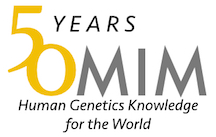
OMIM names a rare genetic disorder after an NRI researcher
 Dr. Christian Schaaf, assistant professor of molecular and human genetics at Baylor College of Medicine and a faculty member of the Jan and Dan Duncan Neurological Research Institute at Texas Children’s Hospital, and his colleague Dr. Yaping Yang, associate professor of molecular and human genetics at the Baylor College of Medicine, were recently informed by the OMIM (a database called Online Mendelian Inheritance in Man) that a new genetic disease they had discovered would bear their names -- Schaaf-Yang syndrome.
Dr. Christian Schaaf, assistant professor of molecular and human genetics at Baylor College of Medicine and a faculty member of the Jan and Dan Duncan Neurological Research Institute at Texas Children’s Hospital, and his colleague Dr. Yaping Yang, associate professor of molecular and human genetics at the Baylor College of Medicine, were recently informed by the OMIM (a database called Online Mendelian Inheritance in Man) that a new genetic disease they had discovered would bear their names -- Schaaf-Yang syndrome.
Two years ago, in a paper published in Nature Genetics, Schaaf and Yang had described a novel genetic syndrome that is caused by mutations in the MAGEL2 gene. Infants with this rare syndrome exhibit many clinical characteristics of a classic genetic disorder, Prader-Willi syndrome, especially in the first year of life. In fact, most of them were suspected to have Prader-Willi syndrome, based on their presentation in early childhood. However, as patients with MAGEL2 mutations grow older, they exhibit different clinical symptoms than Prader-Willi patients (i.,e increased risk for autism, but less tendency towards obesity). In fact, genetic testing of these patients confirms that they do not have Prader-Willi syndrome. Thus, these patients had remained medical mysteries for many years until Schaaf-Yang’s discovery in 2013.
Based on the initial discovery and report, so far, more than 20 patients with this novel genetic syndrome have been identified in the US and in Europe. Their molecular and clinical description has helped define the condition, and Schaaf leads the international effort to collect all of their data in one comprehensive database. As clinical phenotypes of this disorder get better defined and more clinicians use it as a differential diagnosis, it is expected that many more patients will receive appropriate diagnosis.
Until last week, this novel genetic syndrome did not have a separate name, which caused considerable confusion among the medical community and patient families. Therefore, OMIM (Online Mendelian Inheritance in Man), a database that is a comprehensive, authoritative compendium of human genes and genetic phenotypes, and is authored/edited at the McKusick-Nathans Institute of Genetic Medicine, Johns Hopkins University School of Medicine, under the direction of Dr. Ada Hamosh, have decided to rename this Prader-Willi-like syndrome as Schaaf-Yang syndrome.
The new name helps distinguish this condition as an entity by its own, and will avoid confusion amongst affected families as well as treating physicians. At the same time, this may pave the way for better diagnosis and development of specific treatment regimens for the affected patients.